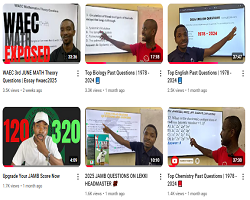Introduction
Welcome back to this English tutorial!
In this session, we will continue solving past English examination questions, focusing on prepositions, antonyms, sentence structure, and punctuation. These questions are drawn from WAEC, NECO, and JAMB past papers and are designed to help students master key areas tested in Use of English for secondary school and entrance examinations.
You can watch the full class in the video below:
Question 51: Correct Preposition Usage
Question:
He was caught ___ the act of stealing.
Options:
- A) in
- B) by
- C) for
- D) on
Explanation:
The correct preposition here is in. The phrase “caught in the act” is a fixed English expression meaning someone was apprehended while committing the act.
Answer: A) in
Question 52: Meaning of “Epiphany”
Question:
What does the word Epiphany mean?
Options:
- A) A moment of sudden realization or insight
- B) A small object or trinket
- C) A religious holiday
- D) A feeling of dread or anxiety
Explanation:
An epiphany is a sudden moment of clarity, realization, or insight about something. It is commonly used in literature and personal reflections.
Answer: A) A moment of sudden realization or insight
Question 53: Subject-Verb Agreement in Compound Subjects
Question:
Choose the correct sentence:
- A) Neither the teachers nor the principal were at the meeting.
- B) Neither the teachers nor the principal was at the meeting.
- C) Neither the teacher nor the principal were at the meeting.
- D) Neither the teachers nor the principal were at the meeting.
Explanation:
When two singular/plural subjects are joined by neither…nor, the verb agrees with the subject closest to it. Here, the closest subject is principal (singular), so the correct verb is was.
Answer: B) Neither the teachers nor the principal was at the meeting.
Question 54: Opposite of “Sublime”
Question:
The opposite of sublime is:
- A) Ordinary
- B) Incredible
- C) Superficial
- D) Awful
Explanation:
Sublime means something excellent, impressive, or grand. Its direct opposite in this context is awful, which denotes something unpleasant or bad.
Answer: D) Awful
Question 55: Correct Punctuation in a Sentence
Question:
Which of the following is a correctly punctuated sentence?
- A) He likes music, and dancing.
- B) He likes music and dancing.
- C) E likes music and dancing.
- D) He likes music and dancing, this is definitely wrong.
Explanation:
The sentence requires no comma since music and dancing are closely related ideas. Option B is straightforward and correctly punctuated.
Answer: B) He likes music and dancing.
Watch more educational videos and past questions: https://youtube.com/@allcbts
Conclusion
Mastering prepositions, antonyms, and subject-verb agreement is crucial for excelling in Use of English examinations like WAEC, NECO, and JAMB. By practicing these past questions and understanding their explanations, students can significantly improve their accuracy and speed during exams.
Stay tuned for more tutorials covering comprehension passages, oral English, and advanced vocabulary to help you achieve top scores in your exams.
Related Videos:
- Understanding Waves and Properties in Physics
- Biology Past Questions For UTME
- IELTS Writing: How to Write an Opinion Essay
- JEE 2026 Chemistry Solving Questions
- Further Mathematics Senior Secondary Questions
SEO Keywords
- English grammar past questions with answers
- JAMB WAEC NECO English past questions
- subject-verb agreement multiple-choice questions
- preposition usage in English exams
- antonyms and synonyms past questions
- correctly punctuated sentences examples
- WAEC English comprehension and lexis tutorial
- common errors in English use for exams
- secondary school English past questions
- Use of English exam preparation tips


 No products in the cart.
No products in the cart.